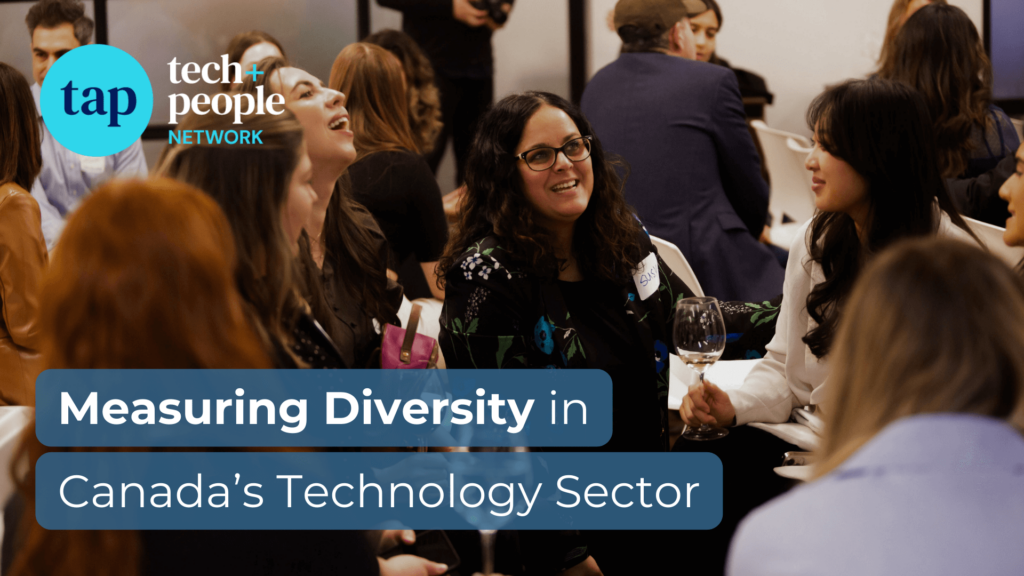This is a guest post by the team at TAP Network. TAP Network was a sponsor at the inaugural Rethinking Disbilites event on November 30, 2023, in Toronto. TAP conducts a variety of invaluable research that targets the Canadian technology sector.
TAP Network has just released the 2023 Diversity in Tech Dashboard, which reports year-over-year progress on the representation of equity-deserving groups in Canada’s tech sector. This article is from the team at TAP Network.
Measuring Diversity
The 2023 Diversity Dashboard report showcases data from TAP Network’s 2023 Tech Salary and Total Rewards Survey, which is produced in partnership with Mercer and includes data from over 30,000 incumbents at 204 Canadian tech employers.
Now in its fourth year, the dataset continues to grow as more tech companies measure diversity of their workforces, and the report provides industry-wide data on Equity, Diversity, Inclusion and Belonging policies and practices and employee representation.
Growing Equity, Diversity, Inclusion and Belonging Practices
According to this year’s report, 21% of organizations’ senior leadership teams now have formal accountability for Equity, Diversity, Inclusion and Belonging (EDIB) related goals or mandates and with another 32% considering the practice, we expect this to become more prevalent in the next couple of years.
Training is also becoming more prevalent with 38% stating they are providing EDIB training to leaders and another 30% considering it.
There are some encouraging inclusion practices for people with disabilities:
- 55% of organizations stated that they ask employees if they have accessibility needs and/or accommodation requests; and
- 50% of organizations stated that they ask candidates if they have accessibility needs and/or accommodation requests as part of the recruitment process.
Women, Indigenous peoples, and people with disabilities remain significantly under-represented in Canada’s technology sector
Representation of women has grown to 36.9%. While this is an increase from last year’s 35.8%, it remains significantly lower than the 2021 Canadian census data reporting 50.83% of the population identifying as women. Males represent 62.5% and non-binary or other genders represent 0.6% of the sector.
The number of women in the technology sector has been slowly but consistently growing over the past 3 years. In the Software Developer job family, representation of women has also been slowly climbing, however it remains very low at 17.8%.
Indigenous representation in the sector is 0.9% this year, which remains significantly below Canada’s Indigenous population (5%). This dataset, which has tripled since 2020 as more organizations choose to collect and report this employee diversity data, has ranged from 0.5% to 1.4%.
People with disabilities remain significantly under-represented at 4.2%. This is an increase of 3.5% from 2022; however, Statistics Canada’s 2017 Canadian Survey on Disabilities reported 15.3% of the population aged 25 to 44 years as persons with disabilities and 24.3% of the population aged 45 to 64 years. People with disabilities are significantly under-represented in our tech sector.
Learn how to implement employee well-being into your total rewards with our free guide.
People of Colour and people identifying as 2SLGBTQ are well-represented in the technology sector
According to the 2023 report, representation of people identifying as People of Colour and/or Black is 37.5%. This is higher than the 2021 Canadian census data which reports 26.5% of the Canadian population as a person of colour and/or Black.
Representation of people identifying as 2SLGBTQ is 8.8%. This particular dataset is growing rapidly, having quintupled in the past four years as more companies measure it. During that time, it has ranged from 8.2%-9.8%, which is more than double the 2021 Canadian census data reporting 4% of Canada’s population aged 15 and older identifying as LGBTQ.
Pay Equity
Almost half of the companies in the survey (43%) stated they are conducting pay equity analyses for equity deserving groups.
With pay equity legislation in place in several provinces and pay transparency legislation now in effect in British Columbia and recently introduced in Ontario, the prevalence of pay equity analyses is expected to increase significantly over the next couple of years.
This growing legislation has increased the importance of measuring workforce diversity. Organizations looking to measure the diversity of their workforces can utilize TAP Network’s Diversity Benchmarking Toolkit, found on the association’s EDIB Resource Hub, a best-in-class library with hundreds of resources and tools that employers can use to help build more inclusive, equitable and diverse workplaces.
View the complete 2023 Diversity in Tech Dashboard here.
About TAP Network
TAP Network is a non-profit association for People and Culture professionals in Canada’s tech sector, providing members with access to tech sector data, industry experts and an inclusive peer community to drive innovation, collaboration and results. Through programs and events, TAP Network fosters peer-to-peer connections and collaboration that enable learning and knowledge sharing. The association’s 900+ members lead and influence the People and Culture practices at 250 tech companies spanning numerous subsectors, including ICT, VFX and Animation, Video Game and Interactive Digital Media, Cleantech, AI, Life Sciences and more.








